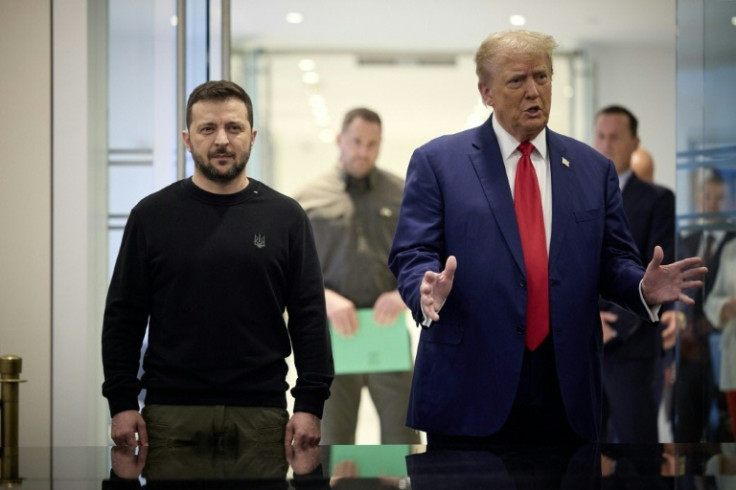Biden In Ukraine Sprint As Trump Victory Throws US Support In Question

Donald Trump's election victory spells immediate doubt for Ukraine in its fight against Russia, with President Joe Biden's administration expected to sprint in its final days to ensure -- insofar as possible -- long-term US support.
Trump, who won an overwhelming victory in Tuesday's election, has in the past voiced admiration for Russian President Vladimir Putin and scoffed at the $175 billion in US assistance committed for Ukraine since Moscow's 2022 invasion.
The 78-year-old tycoon has repeatedly boasted that he can end the war in 24 hours, without explaining how.
His aides have mused about conditioning aid to Kyiv to force concessions, with Vice President-elect J.D. Vance once bluntly saying he did not care what happened to Ukraine, seeing the country as strategically insignificant compared with the global US rivalry with China.
With 10 weeks to go until Trump takes over, the Biden administration is looking to push out the more than $9 billion of remaining funding appropriated by Congress for weapons and other security assistance to Ukraine, officials said.
The Biden team is also looking for structural ways to put European allies in greater charge of assistance to Ukraine before Trump returns, diplomats said.
In a pre-emptive "Trump-proofing" measure, NATO -- the transatlantic alliance that has been criticized by the president-elect -- has already agreed to take over from the United States in coordinating aid to Ukraine.
Ukrainian President Volodymyr Zelensky has also moved quickly with Trump in hopes of preserving ties with Kyiv's top backer.
Zelensky called him Wednesday, offering flattery on his "tremendous victory" and voicing hope for "strong and unwavering US leadership" to bring a "just peace."
Brian Taylor, a Russia expert at Syracuse University, said that if Trump seeks a direct role in Ukraine-Russia talks, he will "quickly find out that the details and the nuances are not so simple as simply telling everyone to stop shooting at each other."
Even a deal to freeze the grinding conflict raises questions on where to draw battle-lines, with Ukraine's military fighting in regions which Russia says it has annexed.
At the same time, Taylor doubted that Europe could immediately replace US military assistance.
"I'm not sure Europe has the stomach or the institutional capacity to just step up and fill that role instantly, although maybe it will develop that capacity over time," he said.
Olga Khakova, of the Atlantic Council, said that Biden could lift restrictions on use of Western weapons on Russian soil, a long-running demand of Kyiv, and boost Ukraine's air defenses to protect its energy infrastructure.
Boosting Ukraine could also appeal to Trump by giving him a stronger negotiating hand, she said.
"Much is still unknown, but this offers a unique opportunity to negotiate from a position of strength and decisiveness and boldness," Khakova said.
Leon Aron, a senior fellow at the American Enterprise Institute, said Trump could ultimately be disappointed by Putin's refusal to budge on demands, resulting in a deal politically unpalatable even in Trump's Washington.
For now, Trump's victory mostly means uncertainty, said Brian Finucane, a former State Department official now at the International Crisis Group.
"Further substantial US military aid seems doubtful, but Trump himself has been vague about how specifically he would deal with the conflict," Finucane said.
Representative Michael Waltz, a Republican army veteran seen as a contender for a national security position, said in a pre-election interview that Trump could find ways to press Putin, including by tightening enforcement of sanctions on Russian energy exports.
"I think that will get Putin to the table. We have leverage, like taking the handcuffs off of the long-range weapons we provided Ukraine as well," Waltz told National Public Radio.
Trump, he said, is "very focused on ending the war rather than perpetuating it."
© Copyright AFP 2025. All rights reserved.





















